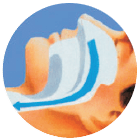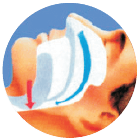 Obstructive sleep apnea
Obstructive sleep apnea- Common disorder in which the patient has one or more pauses in breathing or shallow breaths while sleeping.
- People who have obstructive sleep apnea stop breathing repeatedly during sleep because the airway collapses.
- As a result,air is prevented from getting into the lungs & reduces the oxygen in the blood.
| Normal Breathing | Obstructive Sleep Apnea |
|---|---|
 |
 |
 Symptoms of sleep apnea
Symptoms of sleep apnea- Snoring
- Day time fatigue and sleepiness
- Sleepiness while watching tv or reading
- Morning headaches
- Urination at night
- A dry throat on waking up
- Gasping or choking at night
- Teeth grinding
- Disrupted sleep
- Night time arm and leg movements
 Medical complications of sleep apnea
Medical complications of sleep apnea- High blood pressure
- Heart failure
- Stroke
- Obesity
- Diabetes
- Increase risk of having work related or driving accidents
 Emotional complications of sleep apnea
Emotional complications of sleep apnea- Mood swings
- Irritability
- Poor memory, learning problems or inability to concentrate
- Personality changes
- Panic attacks
 Link of obstructive sleep apnea and medical diseases
Link of obstructive sleep apnea and medical diseases- High blood pressure
- Stroke
- Type II diabetes
- Chronic pain syndrome
- Insomania
- Women who have gone through menopause
 Diagnosis of sleep apnea
Diagnosis of sleep apnea- In order to be properly diagnosed, an overnight sleep study is undertaken where sleep patterns, breathing, Oxygen levels and heart activity are monitored and recorded. The overnight recording is safe and painless.